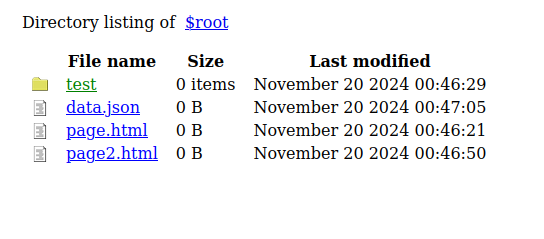Advanced file indexer
#software
A simple file indexer in php for your web server, with advanced customization
One of the many tools I made to simplify web management, although this one I neved used it because it’s not really the best in terms of security and I could not spend enough time to thoroughly test it to make sure it’s safe to use. It was a fun experiment though and I learnt a lot of PHP and the m4 template engine.

Introduction
Advanced file indexer is similar to the default Apache index page: it will list files and directories in the root of your site, but it’s more advanced as it is completely customizable. It also makes it possible for you to disable direct file download, and instead use a form to perform any check you might need, or authenticate the user trying to download the file.
If so, you will need to change the file download-form.php to add all your desired logic.
Warning. This program uses the PHP function readfile() and could potentially expose sensible information and/or the entire file-system. There are only a handful of checks on the files you can download, and I cannot guarantee the security of your files outside the root directory. This program is only intended to be used in a private network. Use this program at your own risk.
Installation
The program is composed of various source snippets that are assembled together by m4. Just use the provided Makefile and it will assemble the file index.php; alternatively you can grab a pre-built index.php in the releases section of this repository. This is the only file you’ll need, and you can copy it in the folder you want to index. In order to correctly (and transparently) handle URLs, your webserver needs to be properly configured.
An example of configuration for apache2 is as following:
<VirtualHost *:80>
# server name and root
ServerName file.example.com
DocumentRoot /var/www/html/
# set permissions and index page
Options -Indexes
DirectoryIndex index.php
# give path to index.php
RewriteEngine On
RewriteCond %{REQUEST_FILENAME} !-f
RewriteCond %{REQUEST_FILENAME} !-d
RewriteRule (.*) /index.php/$1 [L]
</VirtualHost>
Requirements
There are no particular requirements to run this program. The script has been tested with php 7.4.3, but should work with any recent version. To assemble the file you’ll need m4, which should already be installed in most Linux distro.
This program has only been tested with apache2 on Linux. Compatibility with other servers is unknown (but expected), windows compatibility is not expected and thus unknown.
Credits
Thanks Ales Meub for the great old-school icons!